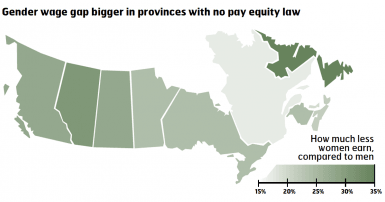Irene Janson | CUPE Equality
In the 1960s, we forced an end to separate collective agreements for men and women. Since then, we’ve won pay equity battles in every province – some through legislated pay equity plans, others through bargaining, including strikes. CUPE’s equality history timeline documents groundbreaking pay equity wins.

Pay equity legislation has narrowed the gender pay gap, but discrimination persists, and we press for better laws. The complaints-based system that exists in federally-regulated workplaces and four provinces (British Columbia, Alberta, Saskatchewan and Newfoundland and Labrador) has failed. Pay equity legislation in Manitoba, Nova Scotia and Prince Edward Island boosted equity but was a one-time initiative and only covered certain workplaces. The New Brunswick law has similar flaws, and adjustments are slow to come.
Our greatest success has been in Ontario (600 joint pay equity plans) and Quebec (300 plans). These two provinces have proactive laws that cover both the public and private sectors. Even in those provinces, we are challenging regulatory gaps. At the federal level, CUPE is currently pressing for federal pay equity legislation.
Better pay equity laws are needed because gender pay gaps persist despite women’s increased education and labour force participation. Canada has the seventh largest wage gap of 34 Organization for Economic Cooperation and Development countries. Women working full-time and full-year in Canada earn 72 per cent of what men earn, on average. Racialized, immigrant and Indigenous women and women with disabilities get paid even less, on average.
Pay equity laws are only part of the solution. We also need employment equity, universal child care, strong public services, decent work, living wages, free collective bargaining, tax reform and other measures to end the gender earnings gap.
See CUPE’s submission to the federal House of Commons Special Committee on Pay Equity for more on our campaigns for stronger pay equity laws and the part they play in ending wage discrimination.


